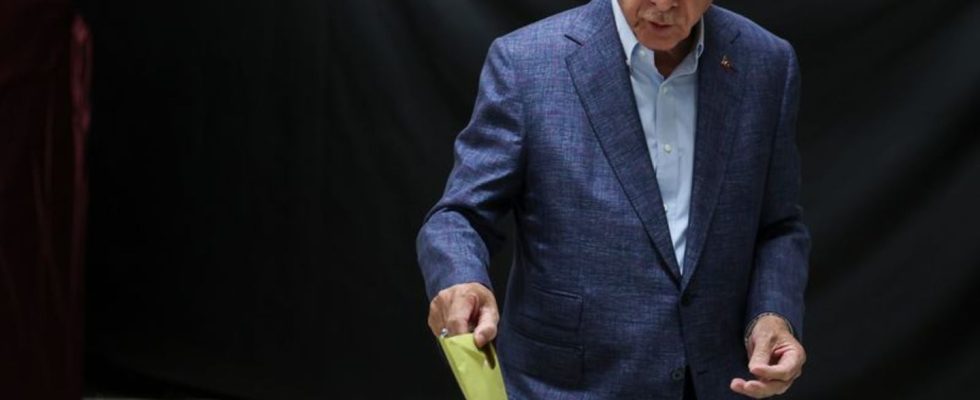Pioneering choice
Türkiye election: The race for the presidency remains exciting
Turkish President Recep Tayyip Erdogan puts his ballot in a ballot box in Istanbul. photo
© Umit Bektas/Pool Reuters/AP/dpa
Erdogan and his challenger Kilicdaroglu are close in Turkey’s elections. The opposition doubts the state agency’s data and accuses the government of “tactical manoeuvres”.
The expected exciting race between incumbent Recep Tayyip Erdogan and his challenger, opposition leader Kemal Kilicdaroglu, became apparent in the presidential election in Turkey. After counting about two-thirds of the votes, Erdogan was just over 50 percent of the votes, as reported by the state news agency Anadolu.
Opposition leader Kemal Kilicdaroglu reached around 43 percent. If none of the three candidates gets more than 50 percent of the votes, the two leading candidates will go to a runoff on May 28th.
The elections in Turkey are considered landmark and one of the most important in the world this year because of the expected domestic and foreign policy implications.
Opposition: “tactical manoeuvres” when counting votes
Meanwhile, the opposition accused Erdogan’s Islamic-conservative governing party of “tactical manoeuvres” in the counting of votes. According to them, Kilicdaroglu is just ahead, the mayors of Istanbul and Ankara said at a joint press conference in the capital. Erdogan’s Islamic-conservative AKP deliberately objected to the results in opposition strongholds. This makes counting slower and the result is initially in favor of the government.
AKP spokesman Ömer Celik, on the other hand, accused the opposition of a “dictatorial attitude” during the counting of votes because they announced the results early on.
The state agency usually first publishes the counting results in Erdogan strongholds. The first data therefore do not yet allow any conclusions to be drawn about the final result.
According to Anadolu, the candidate of an ultra-nationalist party alliance, Sinan Ogan, was around 5.3 percent. Muharrem Ince of the Fatherland Party withdrew his candidacy shortly before the election, but his name was still on the ballot papers.
After 60 percent of the votes were counted in the parliamentary elections, Erdogan’s party alliance came to around 52 percent, according to Anadolu. The opposition alliance around Kilicdaroglu’s CHP won a good 33 percent of the votes, the opposition alliance with the pro-Kurdish HDP party a good 9 percent.
Erdogan with more power than ever
Since the introduction of a presidential system five years ago, the 69-year-old Erdogan has had more power than ever before and can largely rule without parliament. Critics fear that the country, with a population of around 85 million, could slide completely into autocracy if he wins again. The vote in the NATO country is also being closely observed internationally.
According to an initial assessment by the competent authority, the election ran smoothly. Opposition politicians reported minor incidents from various provinces. Around 64 million people in Germany and abroad were invited to vote. In Germany, around 1.5 million people with a Turkish passport were entitled to vote.
Poor economic situation as a dominant theme
The election campaign was tense and considered unfair, mainly because of the government’s superior media power. The dominant theme was the poor economic situation with massive inflation. Erdogan promised, among other things, an increase in civil servants’ salaries and further investments in the defense industry. He waged an aggressive campaign, calling the opposition “terrorists”. A popular opposition politician had been stoned just a week before the election. Kilicdaroglu wore a bulletproof vest during a performance in the Erdogan stronghold of Samsun on Friday.
Kilicdaroglu is considered a level-headed politician. He comes from the eastern Turkish province of Tunceli and belongs to the Alevi religious minority. The opposition leader wants to restore the independence of institutions like the central bank and get high inflation under control. He stands for a rapprochement with Germany and the EU, but also for a stricter migration policy.

